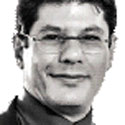
By Samim Akgönül
July 07, 2015
Everyone knows of Macbeth's oracles. In this dark tragedy, Shakespeare tells the story of a Scottish general named Macbeth who, consumed by ambition and compelled by his wife, murders King Duncan and takes the throne for himself, fulfilling a prophecy that had been told to him earlier by a trio of witches. The prophecy was clear: One day, he would become the king of Scotland. The question is whether Macbeth could only have become the king after committing horrible crimes, regardless of the prophecy, or whether the prophecy itself led to him becoming king.
It was Robert K. Merton who introduced the concept of a self-fulfilling prophecy with a reference to the Thomas theorem: “If men define situations as real, they are real in their consequences,” in a book published in 1949, titled “Social Theory and Social Structure."
Recently, in Western Europe, the words “violence,” “Muslims” and “Turkey” have been repeatedly used in the same sentences for structural reasons -- young European Muslims have joined the Islamic State in Iraq and the Levant (ISIL) through Turkey, and Ankara has allegedly supported the so-called Islamic State -- and also because of individual crimes immediately associated with Islamist attacks, such as the recent murder and decapitation that took place in Lyon.
There is no doubt today that, in Europe, individuals and groups of young people perceived as “Muslims” have been radicalized over the past two decades. What is less visible is the fact that Muslims have been so feared and so criminalized during this same period that they have felt excluded from society, marginalized by being categorized as “Muslims,” and thus (some) have actually become radicalized. A real self-fulfilling prophecy.
Describing 'Young Muslims'
Let's add nuance to the perception of these “Muslims.” First of all, “Muslim” is an ideal-typical category of belonging, regardless of belief and/or behaviour. I clearly remember a French television show from 2005 on which a very famous anchorwoman described young people throwing beer cans at police cars during riots in the suburbs as “young Muslims.” In Western Europe, “Muslim” means a young, uneducated suburbanite, likely inclined to crime and radical views, or at least open to radicalization.
Another perception pushing some young Muslims from Western Europe to the point of radicalization and even to the point of joining ISIL is a general public discourse that considers Muslims to be a monolithic category comprising immigrants and aliens. In reality, a huge majority of people perceived as immigrants have never migrated. Furthermore, they tend to be the least mobile fringes of society, dying in the same town in which they were born. Muslims of Europe are products of Europe, and their “Muslimness” is a consequence of their local context.
An analysis of the lives of almost 400 militants from France who have joined ISIL shows clearly that half are converted Muslims. By definition, converts are rarely moderate. It is as true for religion as it is for nationalism. Moreover, many of the Muslim-born young men and women who have joined the group were born, educated and socialized in Europe. They are all Europeans.
Finally, it is also interesting to see that a significant majority of radicalized Muslims in Europe have been “de-mosque-ized.” In other words, they have adopted violence and fundamentalism, not by following an established mosque association, and not after having been influenced by an official imam, but in small groups, sometimes individually, by following an opinion leader, who was himself been marginalized by Muslim communities.
Nevertheless, as Nasreddin Hodja says, one can object: “Be a little fair, is the thief guiltless?!” Yes, among Muslims in general and Muslims in Europe there is a discourse of violence. Yes, some Muslims in Europe defensively maintain their otherness, refusing to become a part of society. And yes, under the discourse of “Islamophobia,” all debates and discussions on taboos and behaviours seen as Islamic are locked, and some Muslims in Europe push their susceptibility until radicalization.
The result is a self-fulfilling prophecy: Muslims are accused of being violent as a people, and so some become violent. The solution, if there is one, is not, of course, in the concept of cohabitation, which presumes a possibility of living together side by side but without interaction.
Nor is it in the concept of “integration,” which is perceived as being a hierarchical claim of the majority toward a minority that already sees itself as being in a dominated position. The solution, if there is one, is in the concept of inter-culturality. Muslims and non-Muslims are interacting; they give and receive cultural attributes, enriching European society. Trying to build thick walls opens the door to radicalization. But interculturality is possible only with a positive attitude toward dynamic multi-belonging. Muslims…are not Muslims. At least they are not only Muslims. They have, as do all European citizens, multiple social, ethnic, religious, gendered and generational identities. They mustn't be imprisoned by an imagined religiosity, and they mustn't imprison themselves within a single, religious identity.
Source: http://www.todayszaman.com/columnist/samim-akgonul/european-muslims-and-violence-a-self-fulfilling-prophecy_393062.html




 Moderate Islamist here
Moderate Islamist here


0 comments:
Post a Comment